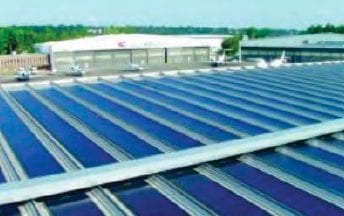A 35-year-old Melbourne based company has produced a composite roofing product, Enersheet, combining solar photovoltaic (PV) technology with a rigid roof backing.
The Specialty Group was originally approached five years ago by solar panel manufacturer Flexcell, looking for rigid backing material to their thin PV film technology.
After three years of research and development, Specialty is about to enter into field trial phase in locations around Australia. According to Specialty’s CEO, Daniel Leipnik, the company hopes to have a “fully commercialised, 100% Australia-made, product within a year”.
The company is currently a large volume manufacturer of raw materials that creates over 1200 different types of industrial technical materials, textiles, chemicals and plastics, used in over 20 industries.
Leipnik said the company hopes to target customers “mainly in the roofing industry but also people concerned with commercial industrial buildings, such as landlords or owners relacing old rooftops”.
Due to the size of the PV panels that are made, around 6-10 meters, they can only currently be used for large-scale commercial buildings.
Commercial and industrial tenants historically have high-energy demand in their daily activities. Leipnik hopes that their new technology can provide “onsite real-time energy generation”.
Testing that has been conducted by the company has received solar panel efficiency values of 11.5 per cent to about 14 per cent, depending on the geographic location. The solar panels can generate approximately 100 watts per square metre.
The PV panels also have no glass components; you can walk on any part of the product as well as being able to transport them with more ease than traditional solar panels. The final product is also lightweight, only seven kilograms per square metre, making it easy to transport.
The company has previously received $4 million in funding from the Victorian Government Department of Environment and Primary Industries’ Energy Grant program.
Specialty, although still in field test phase, already has the capital capacity to be producing up to 10,000 metres of Enersheet material per day with its fully automated $3.4 million resin impregnation line technology.
Daniel stressed that the company wanted “to head in this direction because we wanted to start producing products that would contribute to the planet”. More importantly, he stated “commercial industry in Australia has under 1 per cent of deployment of renewables, lagging behind many other developed economies”.
Currently a top 8 finalist for the Australian CleanTech Awards, Leipnik praised the awards for “providing a mentor to sit down with us and develop a 10-page program to visualise the commercialisation progress of the product”.










